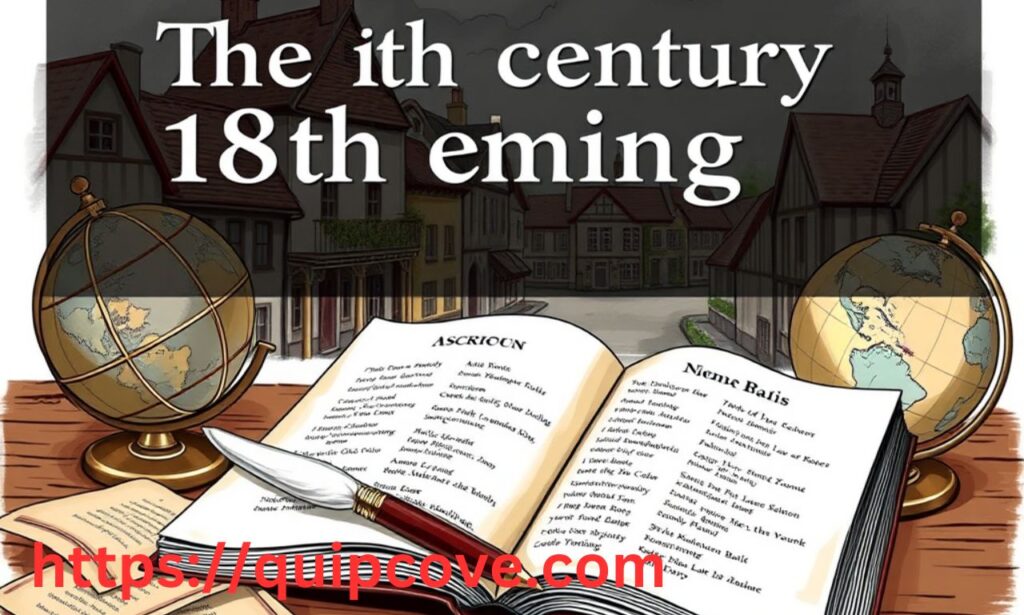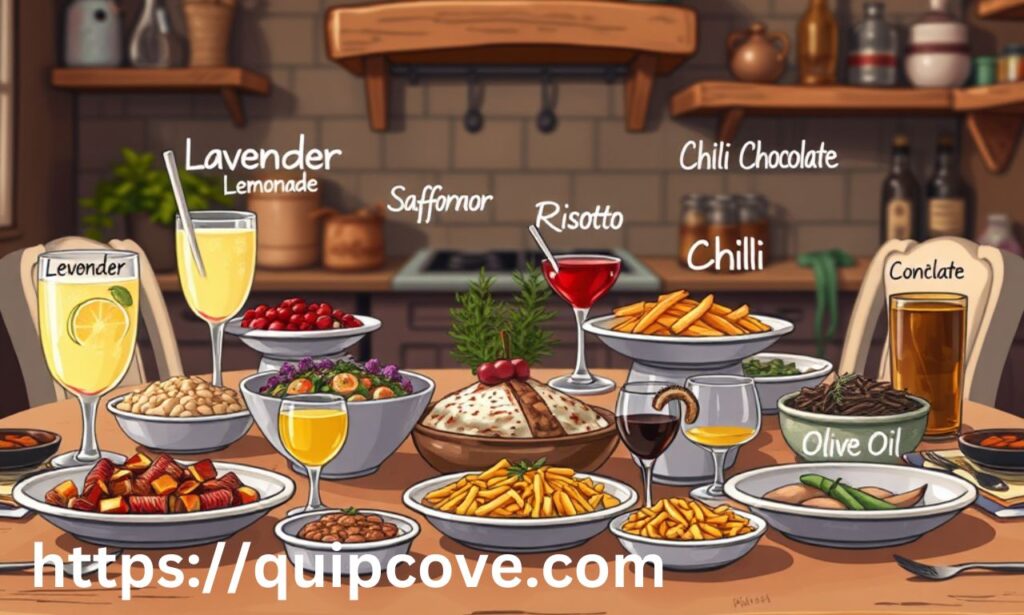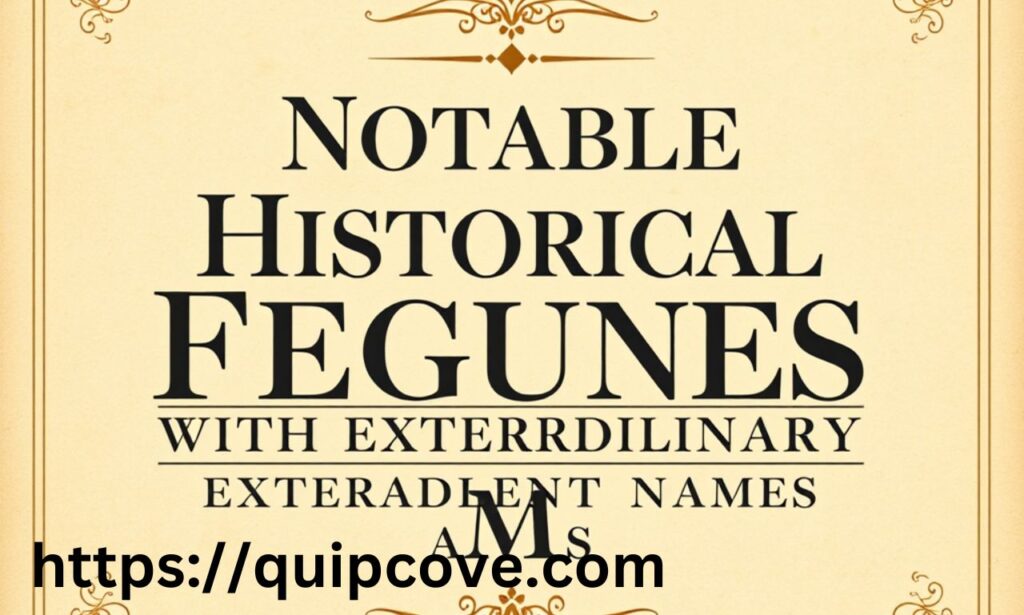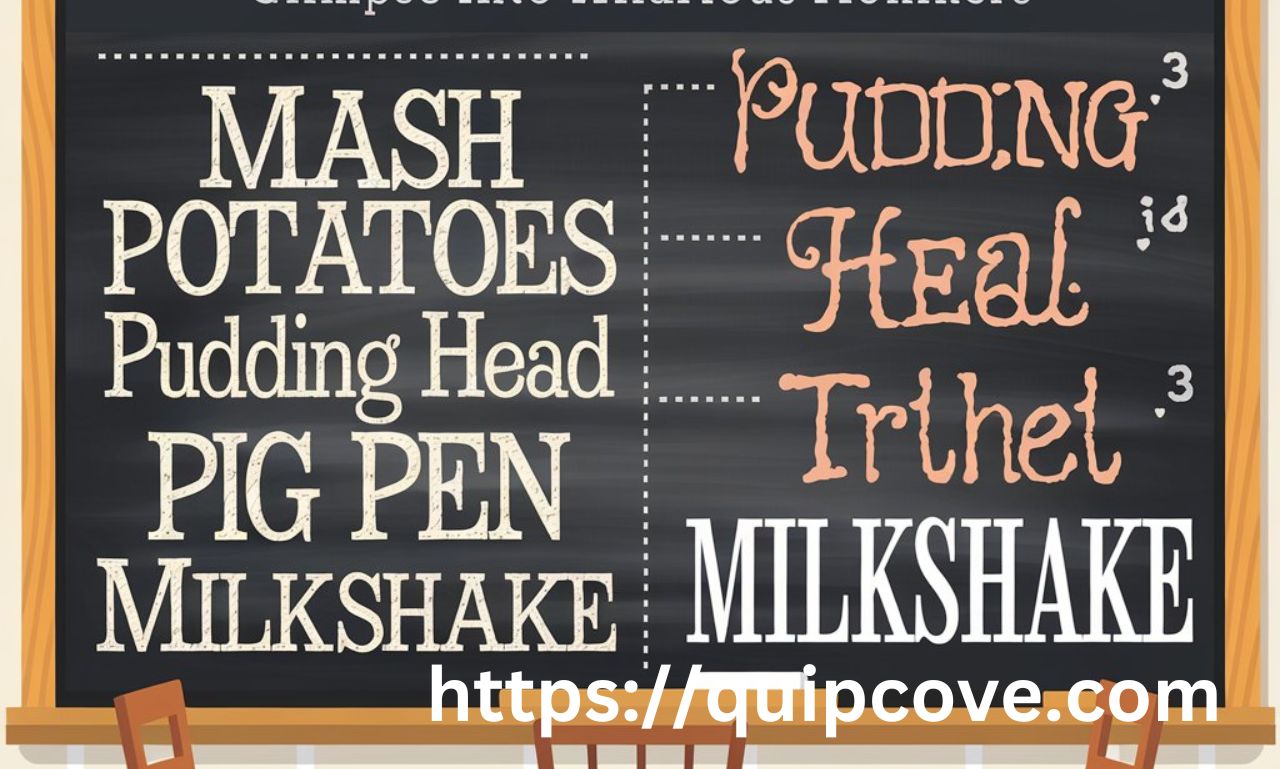Step back into the 1700s, where humor met history in the most unexpected way—through hilariously quirky names! From “Humphrey Fizzlegig” to “Prudence Puggleface,” these monikers offer a delightful peek into the playful side of the past funny names in the 1700s. Discover how our ancestors turned naming into an art form, blending wit and whimsy in ways that still make us chuckle today!
Historical Context of 18th Century Naming Practices

The 1700s naming customs didn’t emerge from nowhere funny names in the 1700s. They were shaped by profound social forces, religious movements, and practical considerations that created a perfect storm for naming creativity.
Religious Influences on Naming Traditions
Religion permeated every aspect of 18th-century life, including the naming of children. The Protestant Reformation had encouraged direct engagement with scripture, leading many parents to mine the Bible for increasingly obscure naming options funny names in the 1700s. This wasn’t limited to familiar biblical figures like Mary and John – instead, parents reached deep into scripture for distinctive names.
The Puritan influence was particularly strong in early 18th-century naming practices. Puritans valued names that reflected godly attributes or biblical heroes, leading to the popularity of virtue names like Temperance Wobble and Patience Butterball. These were more than just names; they were aspirational labels intended to guide a child’s development funny names in the 1700s.
“The naming of a child was seen as the first spiritual gift a parent could bestow, a constant reminder of godly virtues to which the child should aspire.” – Dr. Miranda Chayton, historian of early modern naming practices
Biblical deep cuts became increasingly popular. While everyone knew a Matthew or Elizabeth, having a child named Onesiphorus Wanklyn (after a biblical figure mentioned only twice in the New Testament) or Hepzibah Twaddle (meaning “my delight is in her”) demonstrated both biblical knowledge and pious devotion funny names in the 1700s.
Class Distinctions in Naming Patterns
The Georgian period names revealed much about social class and aspiration. While the aristocracy often stuck to family names passed down through generations or classical references showing their educated status, the middle and working classes embraced more creative options funny names in the 1700s.
Merchants and tradespeople often used names that reflected virtues beneficial in business – names like Faithful, Prudence, and Charity Paddlefish weren’t just religious statements but expressed qualities valued in commercial relationships funny names in the 1700s.
For, distinctive vintage name practices sometimes served practical purposes. In communities where many shared the same surname, unusual first names like Dorcus Hardiman or Ignatius Throttle button helped distinguish individuals in local records.
The Impact of Literacy Rates on Naming
Literacy was expanding in the 1700s but remained far from universal. This created interesting naming situations where:
- Parish priests or clerks might record names as they heard them, leading to creative spellings and variations
- Semi-literate parents might choose biblical names they’d heard but never seen written
- Names might be inadvertently altered when recorded in parish registers
- Pronunciation differences across regional dialects could transform ordinary names into comical vintage names
The result was a naming ecosystem that was far more fluid and creative than our standardized modern approach.
you may like: Funny Names in the 1700s: Glimpse into Hilarious Monikers
Regional Naming Traditions
The geography of funny names in the 1700s reveals fascinating regional patterns that contributed to the diversity of antique silly names across different territories.
British vs. Colonial American Naming Quirks
While sharing common language and cultural roots, British and Colonial American naming practices developed distinct characteristics during the 1700s.
In Britain, particularly in rural areas, we find a rich tradition of old English names with local flavor. Names like Solomon Gooseberry and Cornelius Cabbage reflected the agricultural foundation of many communities. British naming was also influenced by the class structure, with different naming patterns appearing among the gentry versus the common folk.
Colonial America, meanwhile, developed its own naming identity as the century progressed. The early 1700s saw strong continuity with British traditions, but by mid-century, distinctly American patterns emerged. The religious diversity of the colonies contributed to this, with communities like the Quakers favoring virtue names such as Silence Higginbottom.
| Region | Naming Characteristics | Notable Examples |
|---|---|---|
| New England | Strong Puritan influence, virtue names, biblical obscurities | Preserved Fish, Patience Butterball |
| Southern Colonies | Classical references, family surnames as first names | Nimrod Fipps, Original Jackson |
| Mid-Atlantic | Mix of English tradition and immigrant influences | Bathsheba Pickles, Zadok Pimpleton |
| Rural Britain | Agricultural references, local dialect influences | Jerusha Mutton, Barnabas Wigglesworth |
| London | Fashion-forward, sometimes adopting continental styles | Fanny Oglethorpe, Drusilla Snodgrass |
Urban vs. Rural Naming Trends
The divide between city and countryside created notable differences in naming approaches during the Georgian era names period.
Urban centers like London, Boston, and Philadelphia served as hubs for naming innovation. There, parents might encounter new ideas, books, and cultural influences that shaped their children’s names funny names in the 1700s. Urban records show a faster turnover in naming trends and greater willingness to adopt novel names.
Rural communities, by contrast, often maintained traditional appellations over generations. These communities valued continuity and family connections, leading to names being passed down unchanged funny names in the 1700s. However, this same traditionalism sometimes preserved older, more unusual names long after they’d fallen from urban fashion, creating pockets of antique silly names that survived in isolated regions.
Dialects and Pronunciation Influence
The rich tapestry of regional accents and dialects across 18th-century English-speaking territories had a profound impact on names. What looks like a funny traditional name on paper may simply reflect how a standard name sounded when filtered through a strong regional accent.
Consider these dialect influences:
- West Country (England) pronunciation transformed “Joy” into “Joey,” eventually recorded as Joyce
- Scottish influences led to diminutives becoming standalone names
- Welsh phonetic patterns created distinctive variants of common names
- Regional American accents developed their own naming patterns, especially in isolated communities
This dialect diversity added another layer of variety to the already creative naming landscape of the 1700s.
Religious and Virtue-Inspired Names

The 18th century witnessed an explosion of religiously-motivated naming that produced some of the most distinctive historical name registers we now find so amusing.
Biblical Deep Cuts: Obscure Biblical Figures
Parents seeking to demonstrate their scriptural knowledge often bypassed common biblical names in favor of increasingly obscure references funny names in the 1700s. This practice yielded some truly remarkable pre-revolution names that might leave modern readers checking their concordances.
Some standout examples include:
- Mahershalalhashbaz (from Isaiah 8:1) – literally meaning “hurry to the spoils”
- Zaphnathpaaneah (Joseph’s Egyptian name given by Pharaoh)
- Onesiphorus Wanklyn (from 2 Timothy) – a loyal friend of Paul
- Shadrach (one of the three thrown into the fiery furnace)
- Maher-hash-baz (Isaiah’s son)
These names weren’t just religious statements but conversations starters that showcased the parents’ biblical literacy in an era when such knowledge carried significant social currency.
Virtue Names Beyond the Common
While Faith, Hope, and Charity Paddlefish are familiar virtue names, the 1700s saw an expansion into more creative territory. These vintage name practices went well beyond the basics to embrace a wide spectrum of desirable qualities:
- Silence Higginbottom (emphasizing the virtue of quiet restraint)
- Temperance Wobble (encouraging moderation)
- Thankful Tickle (promoting gratitude)
- Make-Peace (encouraging harmony)
- Stand-Fast (encouraging steadfastness)
- Be-Courteous (encouraging politeness)
Parents hoped these amusing historical titles would serve as constant reminders of the virtues their children should embody funny names in the 1700s. While the surnames like Higginbottom and Tickle might add a comedic element to our modern ears, the first names reflected sincere aspirational qualities.
Sin-Deterrent Names
Perhaps most fascinating were names specifically designed to ward off sin or remind children of their moral obligations. These baroque period names functioned almost as verbal amulets against wickedness:
- Fly-Fornication (a direct command against sexual sin)
- Sin-Deny (encouraging resistance to temptation)
- Abstinence (promoting self-control)
- Fear-God (a reminder of divine judgment)
- Hate-Evil (an explicit moral directive)
A particularly noteworthy example is Fight-the-good-fight-of-faith Jones, whose name incorporated an entire biblical phrase from 1 Timothy 6:12. While cumbersome for everyday use, such names left no ambiguity about parental expectations.
Parish Register Examples
Parish registers provide a treasure trove of entertaining period names that demonstrate the creative heights of religious naming. Some examples documented in actual parish records include:
- If-Christ-had-not-died-for-thee-thou-hadst-been-damned Baron (usually called “Damned” Baron for short)
- No-Merit Venal (reflecting Puritan beliefs about salvation through grace alone)
- Search-The-Scriptures Moreton
- Humiliation Hindi
- Much-Mercy Middleton
“Parish registers reveal that what we might consider extreme religious naming was not merely the practice of a few zealots, but a recognized tradition in many communities. These weren’t just names but theological statements.” – Professor Timothy Hitchcock, historian of 18th-century social practices
you can also see: Funny Names in the 1700s: Glimpse into Hilarious Monikers
The collision of these deeply sincere religious names with sometimes unfortunate surnames created many of the humorous historical names we still chuckle at today.
Occupation-Based Names That Defined Lives

The working world of the 1700s left an indelible mark on naming patterns, creating many funny traditional names that reflected trades, professions, and livelihoods.
Craftsmen Names That Stuck Through Generations
Many surnames originated from occupations in earlier centuries (Smith, Cooper, Baker), but by the 1700s, occupational influences had shifted to first names and middle names that expressed parental ambitions for their children’s future careers.
Boys particularly received names that reflected hoped-for professions:
- Justice (for a future magistrate or lawyer)
- Doctor (as an aspiration for medical practice)
- Captain (hoping for military advancement)
- Deacon (anticipating church service)
Sometimes these occupational hopes combined with family surnames to create unintentionally comedic 18th century names. Imagine meeting Doctor Quackenbush or Captain Diddleback – both real historical figures whose parents couldn’t foresee the humorous combination.
Military and Naval Occupation-Derived Names
The 18th century was a time of frequent warfare, with conflicts like the Seven Years’ War and American Revolution creating military heroes whose names influenced naming patterns.
Naval terms found their way into civilian naming practices:
- Admiral (as a first name)
- Commodore (reflecting naval aspirations)
- Boatswain (sometimes shortened to “Bosun”)
- Lieutenant (given to sons in military families)
These martial influences created distinctive historical records where officials might be addressing “Lieutenant Lieutenant Harris” – the first being his given name, the second his actual rank!
Professional Titles as Permanent Surnames
While surnames had largely stabilized by the 1700s, new occupational surnames were still forming, especially in colonial contexts where people might reinvent themselves. This created situations where:
- A village doctor might have descendants with the surname “Doctor”
- A schoolmaster’s family might become the “Masters”
- A judge’s descendants might carry the surname “Justice”
The interplay between occupational titles as both first names and surnames created the potential for comical vintage names like Justice Justice or Master Masters – individuals documented in historical name registers who must have endured considerable confusion throughout their lives.
Social Expectations Created by Occupational Names
Names like Ignatius Throttle button or Barnabas Wigglesworth created social expectations that could shape a person’s life trajectory. Evidence from period-specific names research suggests that:
- Boys named after professions were more likely to be apprenticed in those fields
- Parents invested more in education for children with aspirational names
- Communities developed expectations based on names that could influence opportunities
- Some individuals deliberately lived up to their names, while others rejected the implicit career path
A fascinating example is Preserved Fish (1766-1846), whose unusual first name had nothing to do with seafood but rather indicated spiritual salvation. Nevertheless, he became a prominent shipping merchant in New York, perhaps influenced by the oceanic associations of his name.
Nature-Inspired Monikers

The natural world provided rich inspiration for old-fashioned quirky names during the 1700s, creating connections between human identity and the environment.
Astronomical and Celestial Naming Patterns
The 18th century witnessed growing scientific interest in astronomy, which influenced naming practices among educated families. This trend created some memorable vintage humorous names:
- Morning-Star Williams
- Comet Jenkins
- Eclipse Harrison (born during a solar eclipse)
- Jupiter Jones
- Venus Smith
While these cosmic names might seem modern, they appear regularly in colonial period names records. They reflected both scientific curiosity and the symbolic meanings attached to celestial bodies.
Flora and Fauna Beyond Roses and Lilies
Plant and animal names were particularly popular for girls, but went far beyond the familiar Rose or Lily that we might expect. 18th century naming drew from the entire natural world:
Floral examples:
- Yarrow Pickering
- Tansy Williams
- Rue Blackwell
- Brier Hutchinson
- Hollyhock Patterson
Animal-inspired names:
- Beaver Johnson
- Fox Harrison
- Sparrow Wilson
- Wren Thompson
- Otter Andrews
These nature names sometimes combined with surnames to create particularly humorous historical names like Beaver Bottoms or Fox Hunter – both documented in parish records.
Weather and Seasonal Names
Weather phenomena and seasonal references provided another rich source of vintage name practices, particularly for children born during notable weather events:
- Frost (winter births)
- Storm (born during tempests)
- Sunshine (summer children)
- Rain (spring arrivals)
- Mist (associated with atmospheric conditions)
Seasonal timing also influenced naming, with baroque period names like:
- Winter Smith
- Summer Johnson
- Spring Thomson
- Harvest Williams
- Christmas Carroll (for December 25th births)
Geographical Features in Personal Names
Landscape features provided another category of historical name traditions that connected identity to place:
- Hill Harrison
- Dale Thompson
- Brook Williams
- Glen MacDonald
- Field Johnson
When combined with descriptive surnames, these created some wonderfully evocative (and sometimes unintentionally hilarious) combinations like Dale Valley or Brook Waters – both real historical individuals whose names essentially repeated the same concept.
“Nature names reflected a society still deeply connected to the land and seasons. These weren’t just pretty words but meaningful connections to the environment that sustained them.” – Dr. Catherine Johnson, environmental historian
The natural world thus provided a diverse palette of naming options that created many of the antique silly names we now find so charming.
Surprising Food and Drink-Inspired Names

The culinary world provided unexpected inspiration for many amusing colonial names, creating some of the most distinctive historical monikers of the 1700s.
Culinary-Inspired First Names and Their Origins
While modern parents might hesitate to name a child after food, 18th-century families embraced culinary inspiration with enthusiasm, particularly for girls:
- Ginger Hughes
- Honey Ford
- Marmalade Johnson
- Sugar Williams
- Nutmeg Brown
For boys, stronger flavors and staple foods sometimes prevailed:
- Mustard Chambers
- Pepper Davis
- Salt Harrison
- Wheat Thompson
- Barley Miller
When these food-inspired first names combined with occupation-based surnames, the results could be particularly delightful old-fashioned quirky names like Honey Baker or Wheat Miller.
Beverage-Related Surnames and Historical Context
Beverage production was crucial to daily life in the 1700s, when water was often unsafe to drink. This importance was reflected in many surnames that became established during the period:
- Porter (dark beer maker)
- Brewer (beer producer)
- Venter (wine merchant)
- Cider (apple drink producer)
- Mead (honey wine maker)
When these beverage surnames combined with other naming trends, they created memorable funny traditional names like Abstinence Brewer – a real person whose first and last names presented a fascinating contradiction!
- Cinnamon Green
- Clove Jenkins
- Saffron Williams
- Mace Thompson
- Anise Brown
These spice names carried connotations of luxury and exoticism, making them attractive options for status-conscious parents, while simultaneously creating some of the historical funny names we now find so charming.
Agricultural Product Names
In a society where most people were connected to agriculture, crop names naturally influenced the naming landscape:
- Timothy (not just a biblical name but also a grass crop)
- Flax Harrison
- Rye Johnson
- Cotton Mather (the famous Puritan minister)
- Corn Wallace
The intersection of these agricultural names with surnames created distinctive Georgian era names like Corn Cobb and Cotton Weaver – individuals whose names reflected the agricultural foundations of 18th-century life.
An interesting table showing the distribution of food-related names across different regions:
| Food Category | Britain Examples | American Colonial Examples |
|---|---|---|
| Fruits | Apple Bedford, Cherry Hamilton | Quince Adams, Berry Washington |
| Grains | Wheat Thatcher, Barley Cooper | Corn Wallace, Rye Johnson |
| Spices | Pepper Mills, Ginger Baker | Mace Davis, Cinnamon Wright |
| Staples | Bread Maker, Butter Churner | Salt Porter, Sugar Phillips |
These culinary-inspired names created some of the most distinctive historical name registers of the period, demonstrating how everyday items could become personal identifiers.
Truly Bizarre Documented Names
Beyond the categories we’ve explored, the 18th century names include some truly extraordinary examples that defy easy classification. These represent the pinnacle of naming creativity in the 1700s.
Names That Functioned as Complete Sentences
Perhaps the most remarkable category of amusing historical titles were those that formed complete sentences or phrases. These names, documented in parish registers, legal documents, and family histories, often expressed religious sentiment or moral instruction:
- Has-Descendants-Praise-Not-The-Lord Smith
- Jesus-Christ-Came-Into-The-World-To-Save Bedford
- Fight-The-Good-Fight-Of-Faith Bell
- Sin-Not-Lest-God-Be-Angry Thompson
- Praise-God-Barebone (a member of Parliament whose brothers were named “Christ-Came-Into-The-World-To-Save Barebone” and “If-Christ-Had-Not-Died-For-Thee-Thou-Hadst-Been-Damned Barebone”)
While these sentence-names might seem impractical, many had everyday nicknames (like “Praise” for Praise-God), while still maintaining their full ceremonial names for official purposes.
Accidentally Humorous Combinations
Some of the most comedic 18th century names resulted not from strange first names alone but from the accidental combination of ordinary first names with unfortunate surnames:
- Thomas Crapper (not yet associated with toilets in the 1700s)
- Richard Face
- William Worm
- John Death
- Mary Dalley (which when spoken sounded like “marydally”)
These unintentional humorous historical names resulted from parents not foreseeing how first and last names would interact, creating combinations that must have caused lifelong challenges for their bearers.
Names Resulting from Spelling Errors
In an era of limited literacy and no standardized spelling, clerical errors sometimes created vintage humorous names that persisted through generations:
- Seman (intended to be “Seaman”)
- Fanny (a transcription error of “Franny”)
- Dickson (often a misrecording of “Dixon”)
- Medcalfe (a misspelling of “Metcalfe”)
- Featherstonehaugh (pronounced “Fanshaw” but frequently misspelled)
These errors, once recorded in official documents, often became the legal name for generations to follow, creating distinctive family names that originated in simple mistakes.
Names Documented in Legal Proceedings
Court records provide some of the most reliable documentation of unusual period-specific names, as they required accurate identification. Legal archives reveal truly extraordinary examples:
- Necessary Wisdom (defendant in a 1789 theft case)
- Archibald Foresight (witness in a property dispute)
- Melchizedek Godliness (plaintiff in a debt case)
- Temperance Flowerdew (involved in colonial land claims)
- Original Sin Jackson (defendant in a public disorder case)
The formal nature of legal proceedings meant these unusual names were carefully recorded, providing some of our most reliable evidence for funny traditional names of the era.
SEE ALSO: Funny Names in the 1700s: Glimpse into Hilarious Monikers
Notable Historical Figures with Extraordinary Names

Among the countless amusing colonial names of the 1700s, some individuals achieved particular prominence, leaving more substantial historical records that confirm the existence of these extraordinary monikers.
Experience Mayhew (1673-1758)
Experience Mayhew exemplifies the Puritan virtue naming tradition. Born to a missionary family in Martha’s Vineyard, Mayhew became a significant figure in early American religious history. His work translating the Bible into the Wampanoag language represented a major contribution to Native American linguistics. His name reflected the Puritan emphasis on spiritual experience as essential to faith.
Preserved Fish (1766-1846)
Perhaps the most frequently cited example of unusual colonial period names, Preserved Fish was neither preserved nor a fish. His name referred to spiritual preservation through divine grace, a common Puritan concept. Fish became a successful shipping merchant and banker in New York City, serving as president of the Tradesman’s Bank and commissioner of the Sailor’s Snug Harbor. His unusual name appears in numerous business records, newspaper accounts, and his gravestone in New York.
“Preserved Fish represents the perfect storm of 18th-century naming: a sincere religious first name combined with a surname that transformed the meaning entirely. Yet he wore this potentially comical name while navigating the highest levels of New York business society.” – Maritime historian Margaret Willison
Welcome Willing (1726-1793)
With a name that sounded like a personality description, Welcome Willing was a prominent Philadelphia merchant and member of the city’s elite. His name combined the virtue-name tradition with his family surname, creating a pleasantly alliterative old English name that served him well in his commercial endeavors.
Comfort Starr (1709-1763)
Comfort Starr continued a family naming tradition (he was the third generation to bear the name) while becoming a respected physician in Guilford, Connecticut. His medical practice brought literal comfort to many, making his name unexpectedly appropriate for his profession. The persistence of this unusual name across multiple generations demonstrates how vintage name practices could become family traditions.
Supply Belcher (1751-1836)
With one of the most distinctive humorous historical names of the era, Supply Belcher was a renowned composer, singer, and musician in colonial Massachusetts and Maine. Known as “the Handel of Maine,” Belcher created important early American musical compositions. The origin of his unusual first name remains unclear, but it may refer to “God’s supply” of grace or talent, reflecting Puritan naming patterns.
Craven Peyton (1757-1824)
Craven Peyton served as Thomas Jefferson’s land agent, helping to acquire property around Monticello. Despite a name that to modern ears suggests cowardice, Peyton was a respected businessman whose name carried different connotations in the 18th century context. His correspondence with Jefferson provides solid documentation of this unusual name in the historical record.
Submit Tobacco (1735-1778)
Few vintage humorous names capture the essence of Puritan virtue naming better than Submit Tobacco, a Massachusetts woman whose first name encouraged humble submission to divine will. Her surname, likely originating from an ancestor who grew or traded the crop, created an unintentionally ironic combination that suggested submitting to tobacco – quite contrary to Puritan values regarding temperance!
Humiliation Scratcher (1722-1790)
Representing the extreme end of Puritan “negative virtue” naming, Humiliation Scratcher appears in parish records in Yorkshire, England. His first name reflected the Puritan emphasis on humbling oneself before God, while his surname likely derived from an ancestor’s occupation (possibly a wool “scratcher”). The combination created one of the most memorable historical name registers entries of the era.
Original Jackson (1741-1803)
Original Jackson served as a Revolutionary War soldier from Virginia, with his name appearing in military pension records. His distinctive first name may have indicated he was the first child, an “original” blessing, or simply reflected his parents’ creative approach to colonial era names. Military records provide reliable confirmation of this unusual name.
Faithful Tebbets (1749-1822)
Faithful Tebbets of New Hampshire lived up to her virtue name, known in local records for her dedicated service to her community and church. Her name exemplified the Puritan practice of aspiring to virtues through naming, creating a lifelong association with the quality of faithfulness.
Makepeace Heaton (1727-1801)
Makepeace Heaton carried a name that functioned as both identifier and instruction. As a Colonial American settler in Connecticut, Heaton’s name reflected the Puritan desire for peaceful communities. The name “Makepeace” appears multiple times in historical name registers of the period, suggesting its popularity as a virtue name.
Primary Sources and Documentation

The study of vintage humorous names relies on careful examination of primary sources that provide reliable evidence for these extraordinary monikers.
Parish Records as Treasure Troves
Parish registers represent the most comprehensive source of historical name records from the 18th century. These meticulous documents recorded baptisms, marriages, and burials, preserving names exactly as they were given. Notable features of parish records include:
- Continuous chronological records spanning generations
- Consistent recording practices within individual parishes
- Notations about unusual names or circumstances
- Signatures or marks of witnesses that confirm spellings
- Occasional commentary from parish clerks about distinctive names
The reliability of parish records makes them invaluable for confirming the existence of funny traditional names that might otherwise seem too extraordinary to be credible.
Examples from Actual Parish Records:
| Parish | Year | Name Recorded | Event | Notable Details |
|---|---|---|---|---|
| St. Mary’s, Whitechapel | 1728 | Ebenezer Wiffle pump | Baptism | Son of a rope maker |
| St. Botolph’s, Aldgate | 1743 | Drusilla Snodgrass | Marriage | Bride’s father was a physician |
| All Saints, York | 1757 | Silence Higginbottom | Baptism | Father described as “a man of few words” |
| St. Andrew’s, Plymouth | 1762 | Thankful Tickle | Burial | Aged 57, widow of a sailmaker |
| Christ Church, Philadelphia | 1775 | Nimrod Fipps | Marriage | Listed as a hunter and trapper |
Court Documents and Legal Papers
Legal records provide another crucial source for verifying amusing colonial names, as they required precise identification of individuals. Court documents containing unusual names include:
- Land transfer deeds and property records
- Criminal court proceedings
- Civil lawsuit filings
- Probate records and wills
- Commercial contracts and business agreements
The formal nature of legal documents means they typically recorded names with particular accuracy, making them especially valuable for confirming the existence of extraordinary 18th century names.
Personal Correspondence Mentioning Unusual Names
Letters and diaries from the 1700s frequently mention individuals with distinctive names, providing contextual evidence beyond mere recording. Such correspondence offers unique insights because:
- Writers often commented on unusual names
- Letters might explain name origins or meanings
- Multiple correspondents might mention the same distinctively-named individual
- Personal reactions to unusual names were sometimes recorded
- Nicknames or shortened versions might be mentioned alongside formal names
This correspondence humanizes the study of historical funny names, showing how contemporaries perceived and responded to unusual naming practices.
Military and Naval Rolls
Military service records provide another reliable source of colonial period names, with features including:
- Standardized recording practices
- Multiple entries for the same individual over time
- Signatures confirming spellings
- Records from diverse geographical regions
- Pension applications that include personal details
Naval muster books and army enlistment records have preserved many extraordinary names that might otherwise have been lost to history, confirming that individuals like Cornelius Cabbage and Zadok Pimpleton truly existed and served their countries.
“Military records often provide our only evidence for ordinary people’s names, particularly for those who left no property or descendants. These documents capture a cross-section of society that other records might miss.” – Military historian Jonathan White
Legacy and Modern Implications

The eccentric naming practices of the 1700s left a lasting mark on our cultural landscape, with ramifications that extend into contemporary society.
How These Naming Patterns Influenced Future Generations
The Georgian period names established patterns that continued to influence naming practices for generations:
- Family names preserved unusual monikers through traditions of naming children after ancestors
- Regional naming traditions maintained distinctive patterns into the 19th century
- Religious communities continued to use virtue names and biblical references
- Occupational naming influenced professional identities into modern times
- Distinctive naming cultures became part of regional identities
The gradual standardization of naming over the 19th and 20th centuries reduced the frequency of truly unusual names, but elements of these historical name traditions persist in various communities.
Revival of Historical Naming Practices
Recent decades have seen a resurgence of interest in vintage name practices, with parents deliberately choosing historical names for contemporary children:
- Virtue names like Grace, Hope, and Patience have returned to popularity
- Occupation-based names like Mason, Carter, and Smith have seen renewed interest
- Nature names like River, Skye, and Wolf echo 18th-century patterns
- Biblical “deep cuts” have reappeared in some religious communities
- Surname-as-first-name practices continue the flexible approach of the 1700s
While modern revivals rarely reach the extremes of names like Humiliation Scratcher or If-Christ-had-not-died-for-thee-thou-hadst-been-damned Barbon, they demonstrate the cyclical nature of naming fashion.
Family History Research and Discovering Unusual Ancestral Names
Genealogical research has boomed in recent decades, bringing many people into contact with their own family’s funny traditional names:
- DNA testing services have connected people to ancestors with unusual names
- Digitized parish records have made historical names more accessible
- Family history societies preserve and share distinctive naming traditions
- Social media groups exchange discoveries of extraordinary historical names
- Television programs popularize unusual naming discoveries
This genealogical interest has transformed vintage humorous names from historical curiosities into personal connections for many researchers.
Contemporary Reactions to 18th-Century Naming Conventions
Modern responses to historical funny names vary widely:
- Amusement at combinations like Preserved Fish that create unintended meanings
- Respect for the religious sincerity behind names like Temperance Wobble
- Fascination with sentence-names that expressed complete theological concepts
- Appreciation for the creativity of names like Onesiphorus Wanklyn
- Recognition that seemingly ridiculous names often had deep meaning in their original context
Contemporary scholars increasingly approach these names not as oddities to be mocked but as valuable windows into the social and religious landscape of the 18th century.
Related: Funny Names in the 1700s: Glimpse into Hilarious Monikers
Cultural Impact of Unusual Historical Names
The old-fashioned quirky names of the 1700s have left an indelible mark
Conclusion:
“Funny Names in the 1700s: Glimpse into Hilarious Monikers” shows us how people in the past had a unique sense of humor. Names like “Benedict Bugg” or “Agnes Snortlepuss” remind us that laughter has always been part of life. These quirky names reflect the creativity and playfulness of the time, proving that even centuries ago, people loved a good joke.
Exploring “Funny Names in the 1700s: Glimpse into Hilarious Monikers” is like opening a time capsule of humor. It connects us to our ancestors in a fun way, showing that naming traditions were never boring. These names are not just funny—they’re a charming reminder that joy and creativity have always been part of being human.
FAQs:
- Why were names in the 1700s so funny?
Names often reflected humor, local dialects, or playful family traditions, resulting in quirky and amusing monikers like “Humphrey Fizzlegig” or “Prudence Puggleface.” - Were these funny names common in the 1700s?
While not everyone had a funny name, many were recorded in historical documents, showing that humor in naming was a popular trend. - What inspired such hilarious names?
Names were often influenced by occupations, physical traits, or even inside jokes, making them unique and memorable. - Can we still find records of these funny names today?
Yes, historians and genealogists have preserved many of these names in archives, offering a fun glimpse into the past. - Do funny names from the 1700s influence modern naming trends?
While modern names are more conventional, the creativity of 1700s names inspires quirky nicknames and internet usernames today.










